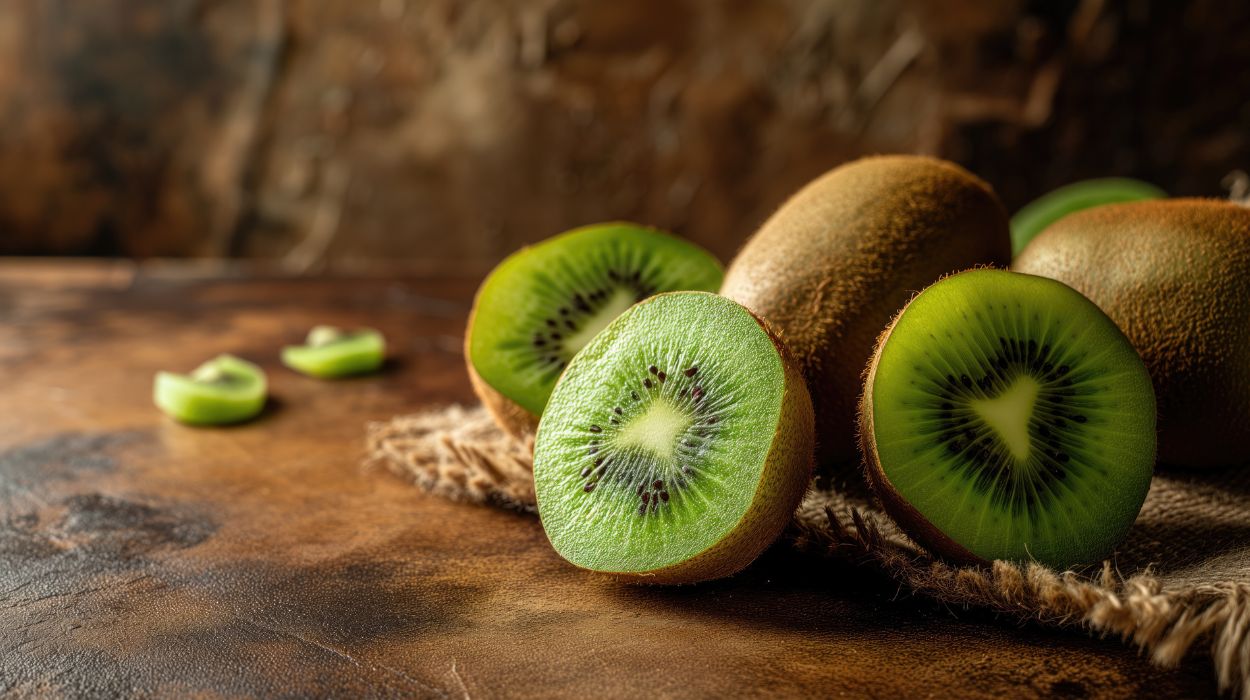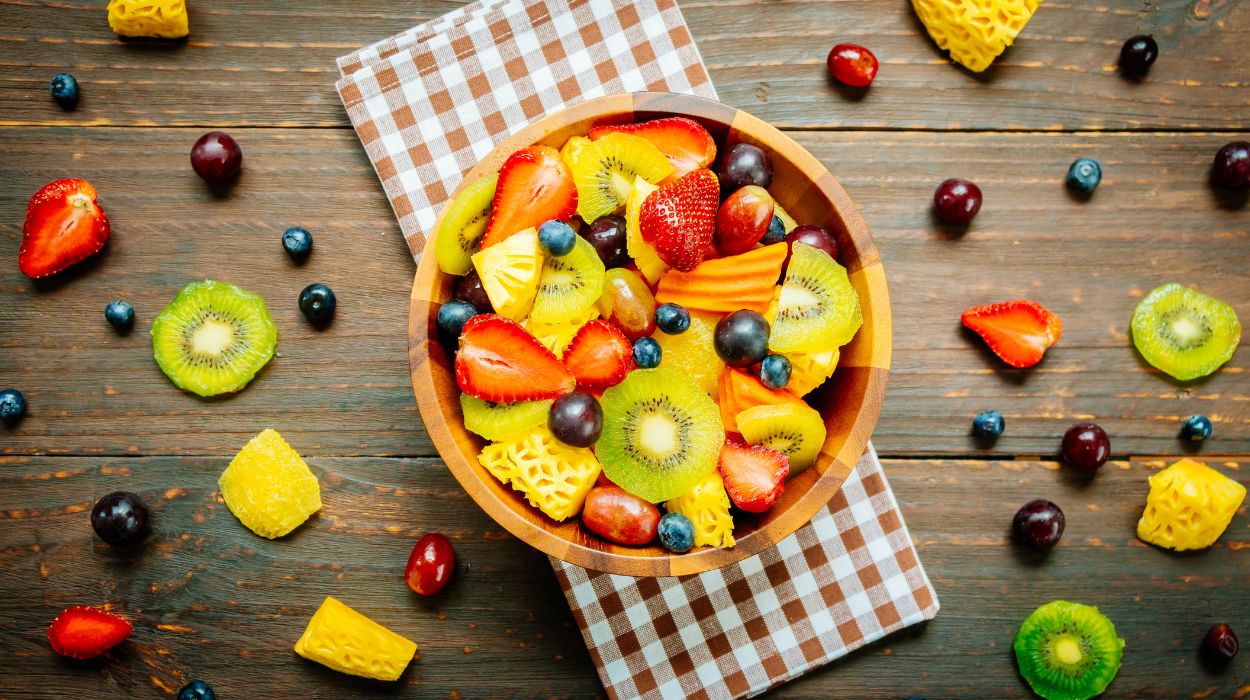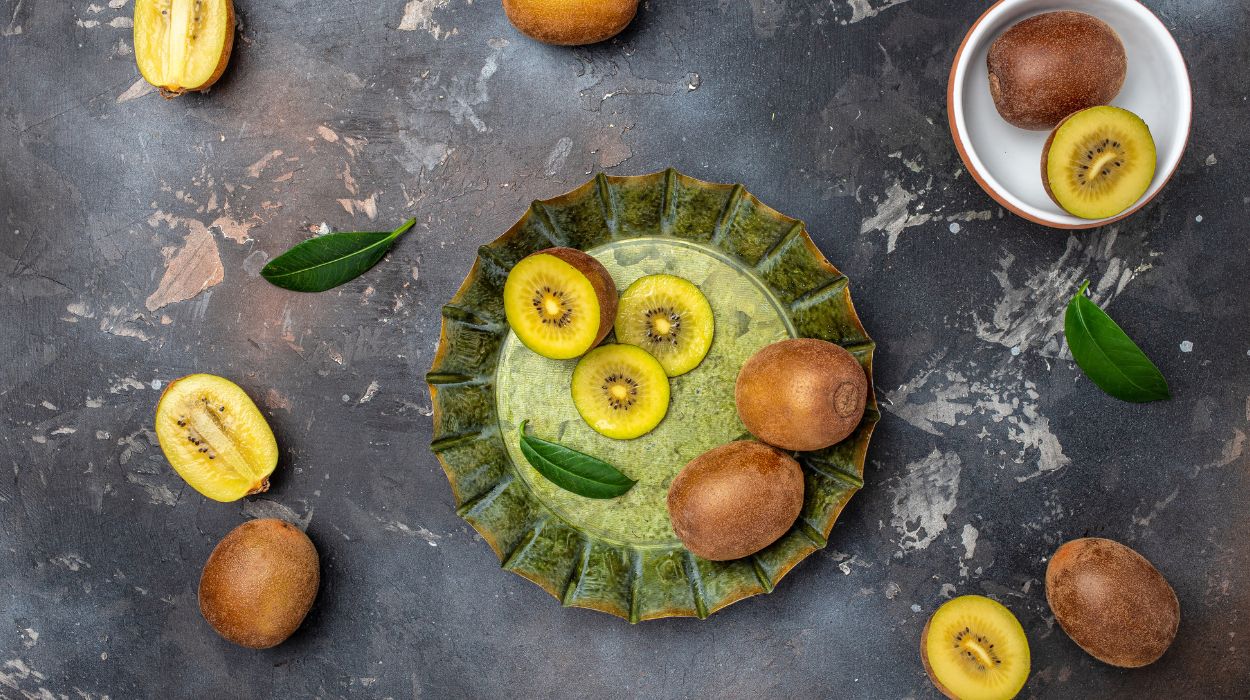Kiwi is a unique fruit for health-conscious individuals, but are all of the stated kiwi benefits true?
An average kiwi, also known as a kiwifruit, is slightly larger than a plum and has a brown, fuzzy surface. The inside is bright green, with many tiny black seeds in the center.
Most people consume the fleshy, green part, but with kiwi fruit, can you eat the skin? Eating the fruit whole may provide additional benefits.[1]
This review clarifies the health benefits of kiwi fruit and the best way to consume it to maximize its health benefits.
What Are The Health Benefits Of Kiwifruits?
The nutrient-dense kiwi fruit has been linked to numerous health benefits, making it a superfood among fruits. Its main health advantages include:
- Improves digestion.
- Promotes healthy weight loss.
- Boosts immunity.
- Combats inflammation.
- Nutritious for pregnant women.
- Improves cardiovascular health.
- Enhances sleep quality.
Health Benefits Of Kiwi Fruit

Kiwi fruit is one of the best superfoods because it is so full of nutrients. It is particularly rich in vitamin C.[2] It also contains fiber, carotenoids, vitamins E and K, potassium, folate, and beneficial phytochemicals.
When included in a healthy diet, kiwi fruit has many nutritional and health attributes, such as aiding digestion, promoting healthy weight loss, boosting immunity, protecting against inflammation, supporting pregnancy, supporting cardiovascular health, and maintaining good sleep quality.
Kiwi’s excellent nutrient profile makes it an excellent choice for people looking to improve their health or those aiming for specific health goals such as weight loss. Among the scientifically proven benefits of kiwis are:
Improves Digestion
Eating kiwis on a regular basis provides your body with soluble and insoluble fiber, both of which are important for a healthy digestive system. Each portion of fruit has 2 grams[3] of fiber. The high insoluble fiber content promotes consistent bowel movement and healthy gut microbiota, while soluble fiber supports heart health and improves metabolic health.
Kiwi is very good for persons who suffer from constipation[4] since the fiber content’s capacity to retain water offers stool firmness and mass, making it easier to pass. Therefore, eating kiwis on a daily basis helps to prevent stool delay in the digestive tract. On the other hand, a healthy gut microbiota[5] promotes digestive health by balancing the immune system, protecting the gut from infections, reducing irritable bowel syndrome, and increasing energy recovery after metabolism. Furthermore, yellow kiwi benefits the digestive tract because of actinidin,[6] a digestive enzyme that aids in the digestion of animal protein in the upper GI tract.
Promotes Healthy Weight Loss
When evaluating fruits for weight loss, kiwi stands out due to its nutritional value. Despite its tastiness, this is a low-calorie, fiber-rich fruit. When consumed often, they keep you feeling full for longer periods since they add bulk to your weight loss diet. Eating kiwis can also assist with cravings and is an excellent substitute for high-calorie snacks.
A balanced diet should include a variety of fruits, lean protein, healthy fats, veggies, whole grains, and frequent hydration to lose weight sustainably.
Boosts Immunity
According to studies, kiwis have up to three times the concentration of vitamin C[7] as oranges, so most individuals looking for vitamin C choose to eat kiwis.
Since the body cannot produce vitamin C on its own, it is usually in high demand, so eating high-vitamin C foods is recommended for a healthy lifestyle. This vitamin is essential to the body because it contains strong antioxidant nutrients. It strengthens the body’s defenses against oxidative stress on cells and organs.
Furthermore, synthesizing neurotransmitters and collagen protein[8] depends on vitamin C. They work together to boost immune responses.
Constant collagen production in the body contributes to kiwi skin benefits. The protein has an anti-aging[7] effect since it fortifies the skin. Other elements in kiwis that strengthen the immune system include potassium, copper, vitamin K, and vitamin E.
Combats Inflammation
Bromelain[9] is a component found in kiwi fruit that helps with inflammation. It usually targets proteins, particularly their inflammatory components. Consuming kiwis on a regular basis increases the body’s supply of bromelain, which is especially beneficial for people suffering from inflammatory disorders such as arthritis or inflammatory bowel disease. Vitamin C, the fruit’s major component, also aids in the elimination of free radicals in the body, thereby countering their inflammatory effects.
Benefits Of Kiwi During Pregnancy
Folate[10] is derived from the folic acid found in kiwi fruit. Folate is essential for fetal development and the prevention of prenatal disorders such as neural tube disease. Folate also promotes placental growth.
Furthermore, because kiwis have high vitamin C content, they promote active iron[7] absorption in pregnant women. Iron is usually in high demand during pregnancy to assist in raising blood volume and ensuring a sufficient supply of oxygen to the fetus. Although such elements can be obtained from fruit and vegetable supplements, they are equally beneficial when obtained from natural dietary sources such as gold kiwis.
Promotes Cardiovascular Health
The American Heart Association suggests eating potassium-rich meals regularly, as well as limiting sodium intake or avoiding excessive salt use. Kiwis are ideal for this category since they are high in potassium, fiber, and antioxidants, all of which potentially reduce the risk of developing various types of cardiovascular disease, like high blood pressure.
Potassium relaxes blood vessels, which is beneficial for patients diagnosed with hypertension. Kiwis’ high fiber content and vitamins support heart health, thus protecting against heart disease. Dietary fiber also improves blood lipid profiles,[11] which reduces bad cholesterol levels in the body.
Improves Sleep Quality
Kiwi fruit contains melatonin,[12] which helps regulate circadian rhythms. These are behavioral, mental, and cognitive shifts that occur in cycles throughout the day. Eating a few kiwis shortly before bed will help you fall asleep faster and stay asleep longer.
Kiwi Nutrition Facts
Kiwis are incredibly high in vitamin C and polyphenols. According to the USDA, a single green kiwifruit, approximately 69 grams in weight,[3] provides the following nutrients:
- Energy: 42.1 calories.
- Protein: 0.787 grams.
- Fat: 0.359 grams.
- Carbohydrate: 10.1 grams.
- Fiber: 2.07 grams.
- Total sugars: 6.2 grams.
- Calcium: 23.5 milligrams.
- Potassium: 215 milligrams.
- Iron: 0.214 milligrams.
- Vitamin C: 64 milligrams.
- Magnesium: 11.7 milligrams.
- Folate: 17.2 micrograms.
- Selenium: 0.138 micrograms.
- Beta-carotene: 35.9 micrograms.
- Vitamin E: 1.01 milligrams.
- Vitamin K: 27.8 micrograms.
Regarding sugar, green kiwis have about the same quantity of glucose and fructose but no sucrose.
The levels of vitamin C and carotenoids are the primary distinguishing features between green and golden kiwis. While green kiwis have twice as much vitamin C as SunGold kiwis,[13] the latter has far less beta-carotene.
How To Eat And Prepare Kiwis

Including kiwis in your diet is simple. Although kiwis can be eaten in various recipes, the most common way to enjoy them is as a raw, sugary snack.
Another option is to consume kiwis whole with their skin. While kiwi skin is edible and potentially rich in kiwi nutrients, its flavor and texture are generally disliked by most individuals.
Additional delicious ways to add kiwi to your diet include:
- Fruit smoothie: If you’re looking for a nutritional boost in the morning, try adding some kiwi to your fruit smoothie.
- Fruit Crisp: To make a tropical fruit crisp, combine kiwis, flour, whole-wheat muffin mix, maple syrup, and a small amount of (light) brown sugar.
- Desserts: You can top breakfast cereal or desserts with diced kiwi.
- Fruit Salads – Incorporate kiwis into your fruit salad to enhance its taste.
- Parfait: Mix some kiwi into Greek yogurt for a delicious treat, and sprinkle crunchy granola or nuts on top.
- Tropical Salsa: Combine mango, red onion, cilantro, lime juice, and kiwis to make a delicious salsa to go with salmon.
Are Kiwi Fruits Safe For Everyone?
Most research indicates that kiwi fruit is well-tolerated, and side effects are extremely rare.[7]
While kiwis are generally healthy, there are a few groups of people who should limit or avoid kiwis altogether owing to health concerns. This includes:
People With Allergies
Certain people are allergic to kiwis.
Kiwifruits contain thirteen potential allergens.[14] According to research, actinidin, an enzyme that aids digestion,[6] is one of the primary allergens found in kiwifruit.
An allergic reaction to kiwi fruits can cause various symptoms, from minor ones like itching and swelling in the lips, mouth, or throat to more serious ones like breathing difficulties or anaphylaxis.
People With Fructose Malabsorption
Some persons may experience an increase in the likelihood of gastrointestinal side effects, including gassiness and bloating, if they consume more fruit and dietary fiber. Unfortunately, fructose is also an ingredient in kiwis, which may aggravate gastrointestinal symptoms in people with fructose malabsorption.[15]
Young Children And Infants
Whole kiwifruits shouldn’t be given to these age groups as they pose a choking risk. Babies who have begun to eat solid foods should be given mashed or pureed kiwi.
People On Blood Thinners
Consuming kiwis can help with blood clotting because they contain vitamin K. Those who take warfarin[16] or other blood-thinning drugs should make sure to get a consistent amount of vitamin K every day.
Too much vitamin K can make warfarin less effective, so you may have to monitor your intake of this high-vitamin K fruit.
Conclusion
Kiwis are an excellent source of digestive enzymes, vitamin C, and antioxidants.
Benefits of kiwis include reduced risk of vitamin C deficiency, improved heart health, enhanced gut health, weight loss benefits, anti-inflammatory properties, and improved sleep quality. Additionally, it is a healthy snack for pregnant women that supports the growth and development of the baby.
To take full advantage of the benefits of kiwi fruit, we recommend eating two kiwis each day, especially before breakfast or another carbohydrate-rich meal.
Frequently Asked Questions
Kiwi may assist your body in several ways, including increasing immunity, facilitating digestion, promoting heart health, and supplying vital vitamins and antioxidants.
Frequent consumption may enhance overall well-being, facilitate digestion, and promote skin health.
Eating one or two kiwis a day will yield the best results, balancing the consumption of nutrients for a nutritious diet.
No, kiwis have less sugar than other fruits, which makes them a filling and healthful snack option.
Yes, the nutrient-rich profile of kiwi makes it a great complement to greens powder. It may amplify the supplement’s many health advantages.
 Evidence Based
Evidence Based
